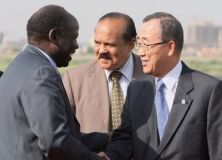UN chief in Sudan to push for Darfur peace
September 3, 2007 (KHARTOUM) — UN Secretary General Ban Ki-moon arrived in Sudan on Monday in a bid to jumpstart the peace process in strife-torn Darfur ahead of a massive joint UN-African Union peacekeeping operation.
 Ban, who has made the Darfur conflict his top priority since taking office in January, will seek to ensure that the 26,000 strong UN-AU force can be deployed quickly to protect civilians who are bearing the brunt of violence.
Ban, who has made the Darfur conflict his top priority since taking office in January, will seek to ensure that the 26,000 strong UN-AU force can be deployed quickly to protect civilians who are bearing the brunt of violence.
He was to have a private dinner with President Omar al-Beshir before heading to Juba in southern Sudan on Tuesday and Al-Fasher in Darfur, returning to Khartoum on Thursday. He is then to head to Sudan’s neighbours Chad and Libya.
The deployment of the hybrid UNAMID force — which will be the world’s largest peacekeeping operation — was agreed by the UN Security Council on July 31 after months of intense diplomacy.
But the full force is not expected to be on the ground before mid-2008 and reports of violence continue to emerge from the ravaged region the size of France.
“I want to know first hand the plight of those we seek to help,” Ban said ahead of his first visit to Sudan as UN chief.
“My goal is to lock in the progress we have made so far, to build on it so that this terrible trauma may one day cease.”
According to UN estimates, more than 200,000 people have died and more than two million have been displaced in Darfur as a result of the combined effect of war and famine since the conflict erupted more than four years ago. But Khartoum disputes the figures and says only 9,000 people died.
“Now we have a historic opportunity. We must seize it,” Ban said last week as he outlined a three-pronged action plan focusing on peacekeeping, political negotiations as well as humanitarian aid and development.
Describing UNAMID as “one of the largest and most complex field operations the United Nations has ever undertaken, together with the African Union”, the UN secretary general stressed that the operation could not succeed without Khartoum’s cooperation.
He said he would seek Beshir’s “full support” during his three-day tour, which includes visit to Darfur for a first-hand look at “the very difficult circumstances under which our forces will operate”.
On Tuesday, he will visit Juba, capital of south Sudan where a 10,000-strong UN force has overseen an uneasy peace between government troops and ex-rebels since the end of a 21-year-old civil war.
Last month Ban slammed a recent escalation of violence in Darfur and urged all the parties to cease military actions.
Khartoum has however rejected allegations that it is still involved in fighting in Darfur after it was accused of violating a UN arms embargo.
Last week, the interior ministry accused Darfur rebels of killing 41 people in an attack on a base for government forces in the neighbouring Kordofan region.
Sudan also recently expelled three Westerners, including two diplomats and the head of the international aid agency CARE. It has since invited back the European Commission envoy to Sudan, who was accused of having improper contacts with opposition leaders, following an apology.
In N’djamena, the Chadian capital, Ban is to confer with President Idriss Deby Itno, whose country has been reeling from a spillover of the fighting in neighbouring Darfur.
At Ban’s initiative, a UN police force backed by European Union troops is soon to be approved to protect camps of refugees and displaced people in eastern Chad and northern Central African Republic.
In Tripoli, Ban is to meet with Libyan leader Moamer Kadhafi, whom he described as one of the key regional players in Darfur diplomacy.
(AFP)
